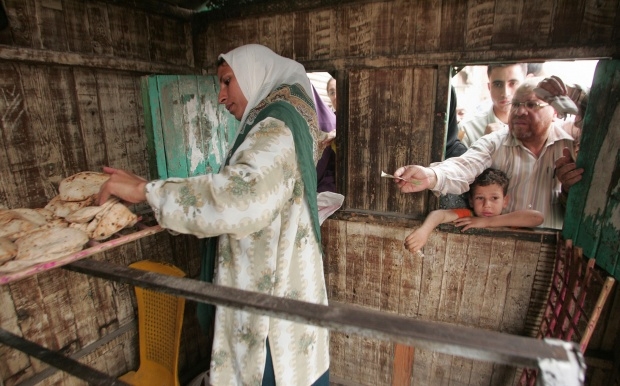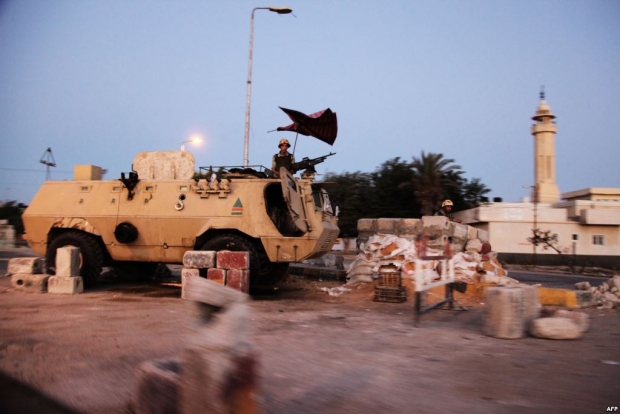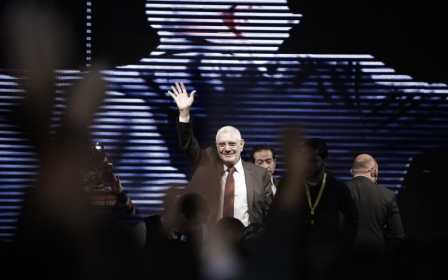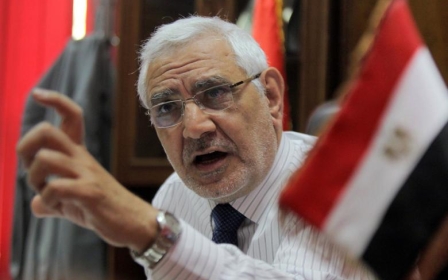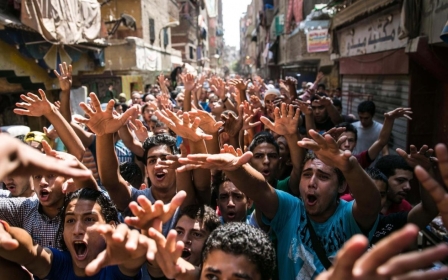Egypt needs stability based on democracy, says former presidential candidate
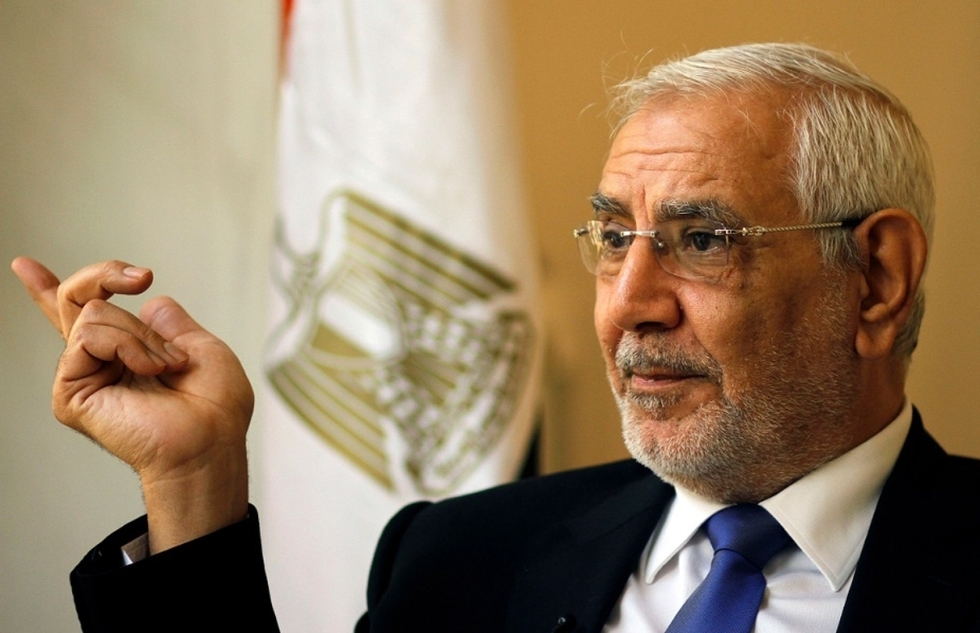
Over the past week, Egyptian politician Abdel Moneim Aboul-Fotouh has made headlines, criticising President Abdel Fattah al-Sisi and urging the country to hold early presidential elections - or face chaos or another military coup.
Following his explosive interview with BBC Arabic last week, an investigation has reportedly been launched into the former presidential candidate and opposition party leader.
The 64-year-old doctor by training became active in politics while attending Cairo University in the 1970s. While serving as president of the student union, Aboul-Fotouh famously debated then-president Anwar Sadat publicly, telling the leader he was surrounded by hypocrites and challenging government restrictions on demonstrations and Islamic political activity.
Aboul-Fotouh served as a member of the Muslim Brotherhood's Guidance Bureau from 1987 to 2009, spending several months in prison in early 2009 under president Hosni Mubarak due to his membership of the party.
He formally quit the Brotherhood to run as an independent candidate in the country's first democratic elections following the 2011 revolution against Mubarak. Following his failed bid Aboul-Fotouh founded Strong Egypt, a party that has since expressed its opposition to both the Muslim Brotherhood and Egypt's current president Abdel Fattah al-Sisi.
Here, the veteran politician talks to Middle East Eye about Egypt's struggling economy, the prospects for democracy and life under the "republic of fear".
Middle East Eye: Your political party is called Strong Egypt. What would a strong Egypt look like to you and how would you get there?
Aboul-Fotouh: Strong Egypt was named after the slogan of a presidential election campaign I ran in 2012, and which millions of Egyptians rallied around.
The project expressed – and continues to express – the goal of establishing a democratic, civilian Egyptian state based on equality between its citizens. The state must be able to give its citizens dignity, and demand their duties from them. It must be able to protect Egypt's national security. Its free, creative and honourable youth must inspire Egypt’s neighbours.
The word “power” here doesn’t mean simply military power – it means power of will, of hard work, of inspiration and of creativity. It means free citizens working together in complete equality. Strong Egypt means working to progress the Egyptian people by protecting the oppressed, whatever their religious, intellectual or political beliefs.
MEE: Elections are happening right now. A lot of political parties that ran in the last election aren't able to run. What is the status of the Egyptian opposition today? Are all of the groups talking to one another?
A-F: I can’t hide the fact that the political situation in Egypt is in dire straits and a state of complete agitation. That doesn’t just apply to the opposition – in fact, the ruling regime is in an even worse state. The current regime has distaste for any political activity, of whatever kind. Despite the fact that there are dozens of official political parties in Egypt, the regime pushed through an electoral law that makes the elections more like a competition to throw money around and to capitalise on tribal and familial prejudices. [This law has stopped] any real political parties that could have put forward an alternative political vision or presented competition [to the regime].
This may all look like a victory for the regime, which is seeking a tame parliament and submissive politicians. But in reality [the election] heightens the tension in the country and pushes it further towards the edge of the abyss. The complete lack of policy and political programmes, and of a real vision, gives no natural, healthy way for people to express their anger or to keep checks and balances on politicians. There is no space for diversity. This will push the youth towards takfiri organisations – it will force citizens to search for new ways, violent and unlawful ones, to achieve the rights that have been denied them. They will demand their rights from the state, or from the businessmen who are conjoined to it.
As for the state of political communication, we have good relations with most parties that supported the January 25 revolution and its goals. However, I am still unsatisfied with the level of communication [between the political parties] and our party is still trying to draw closer to these other parties, whatever their political leanings. We hope that in the future we will be able to agree on shared goals to fight the current political authoritarianism.
MEE: How stable is Sisi's government?
A-F: The stability of the current regime is not built on the legitimacy of achievements or the legitimacy of public contentment, which are the bases of political stability in other countries. The legitimacy of Sisi’s government is still based on the truncheon. The regime relies on people being scared of the future – it says Sisi is the only alternative to IS and other extremist organisations. This is exactly the same way that Mubarak stayed in power throughout all those years of failure.
Egypt needs true stability, based on a democratic structure that allows room for choice, accountability and checks and balances, both of the central government and of the provinces. This will allow Egypt to overcome the current economic crisis and put an end to the corruption that has got so bad that it threatens ordinary people's livelihoods.
MEE: Egypt is struggling financially. What is the solution to the country's economic challenges?
A-F: The Egyptian economy is suffering from structural problems as well as procedural ones. It still depends on profits from the Suez Canal, remittances from Egyptians living abroad and tourism. It is boosted to some extent by income from agricultural and industrial production. But there is an almost complete lack of transparency in economic administration – there are still extremely tight curbs on accessing detailed information about the government’s economic activity. For example, it is extremely difficult to obtain information about the finances of the state’s national service body, which is part of the armed forces, or to find out about land and who owns it.
Egypt's current economic stagnation is a symptom of the chronic structural problems the country suffers from. Every day these problems widen the gulf between different sectors of Egyptian society. There is no hope of solving them without establishing a democratic system that allows for transparency and the circulation of information. Without this, the stagnation will only grow worse, and wealth will continue to pass only through the hands of a small circle of businessmen. This will add to the social problems we are seeing and push more Egyptians, most of whom are already living at or below the poverty line, into penury.
MEE: Do you fear that the Islamic State (IS) militant group, or IS-style groups, are increasing in power in Egypt? How would you address the root causes of IS?
Fortunately, IS and other extremist groups still do not have a foothold in the Delta or in Upper Egypt; their sphere of influence remains limited to North Sinai. However, an increase in oppressive practices and the failure to deal effectively with the root causes of [militancy] will push us towards a future nobody wants for our country.
Takfiri organisations, among them IS, emerged for various reasons. One of these is ideological: extremist ideas found fertile ground because of the almost complete lack of persuasive preachers who were able to engage in debate and to promote the authentic, spiritual soul of Islam, one that calls on believers to protect civilians, whatever their religious beliefs. A host of organisations can be blamed for this failure [to provide quality religious instruction] including official ones like al-Azhar and unofficial ones like the Muslim Brotherhood, the salafists and others. All of these devoted themselves to political conflict, whether to protect the current regime, as is the case with al-Azhar, or to bring it down, like the Muslim Brotherhood. None of them paid attention to their primary mission, that of preaching wisdom and spreading goodness among the youth.
Another factor driving this phenomenon is the oppression meted out by the various regimes that have ruled Egypt for decades. Egyptians from across the spectrum feel that they have suffered persecution, discrimination and ill treatment at the hands of these regimes. This has sown the seeds for distorted understandings.
To tackle the root causes of militancy - which threatens the future of Egypt and the stability and safety of its people - we must open the door for young people to express their opinions openly, rather than pouring them out in ignorant darkness. The bodies that are responsible for religious preaching must devote themselves to their proper mission, and distance themselves from party-political conflicts - they aren't good at party politics, and it destroys their credibility [as religious organisations].
MEE: What is your message to Europe and the US about how they can help Egyptians?
A-F: My message to Europeans and Americans, and the world at large, is this: we are a free people capable of helping ourselves, and of dealing with the consequences of our choices. We ask you to not to support oppression, and not to collaborate with criminals as you did with Mubarak. Please don't interfere in the Egyptian political scene in any way. We just need you to share your artistic, technical and scientific experience in all fields, without political influence on any group or organisation.
You have experienced political and economic crises after revolutions and wars, just as we are now. Your experiences have taught you that, in the end, democracy is the best way to achieve a peaceful transition of power. You must give us the opportunity to learn this. Don’t advance your narrow economic interests at the expense of human rights and democratic principles.
MEE: You must look around the region and see it in a state of instability that you've never seen before. How would you address these challenges, whether in Syria, Iraq, Libya or elsewhere?
A-F: The international community bears a large amount of responsibility for the chaos we are now seeing in Syria, Libya and Iraq; if the great powers, whether in the region or the world at large, had been serious about halting their co-operation with criminals like Assad or Gaddafi or the sectarian regime in Iraq, the crises would not have reached this level.
These peoples [in Iraq, Syria and Libya] were simply trying to achieve their rights and be ruled by a rights-based system rather than by gangs that seize power with the help of regimes that want to exploit the resources of these countries. Sadly, these efforts [to achieve their rights] were met only with violence. The intelligence arms of these regimes tried to conscript followers to guarantee their interests, even if these interests were achieved on top of the corpses of Iraqis, Libyans, Syrians and Yemenis.
We demand that the Arab powers leave these countries alone and give these peoples the right to decide their own future. If the current situation continues and these oppressive regimes stay in power, it will create a ball of flame that will explode in the faces of everyone, without mercy. When that happens, the catastrophe won’t be confined to our region, but will extend to their countries too.
MEE: Can Egypt play a role in stabilising the region?
A-F: Egypt can do that only if it escapes from dictatorship and oppression. Egypt can be a political, cultural and social force when its leadership is taken over by democrats who understand the value of Egypt and its symbolism in the Arab and Islamic world.
MEE: Are you afraid of what may happen to you, given your interview last week with BBC Arabic and the investigation launched on Sunday?
A-F: We are now living in the shadow of a republic of fear - but I have always expressed myself since my youth, under Sadat and then Mubarak. I speak only to quiet my conscience, and to express love for my country and my people.
Egypt is in dire need of a rhetoric that searches for a sensible political solution and avoids both despotism and terrorism. We need to ensure that the language of reason overcomes the language of force. We need tolerance between all political factions. But we must remember that tolerance never means waivering from the attempt to bring to justice all those who have committed crimes against our people, either in the past or in the present.
New MEE newsletter: Jerusalem Dispatch
Sign up to get the latest insights and analysis on Israel-Palestine, alongside Turkey Unpacked and other MEE newsletters
Middle East Eye delivers independent and unrivalled coverage and analysis of the Middle East, North Africa and beyond. To learn more about republishing this content and the associated fees, please fill out this form. More about MEE can be found here.


